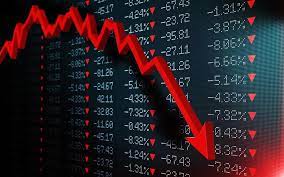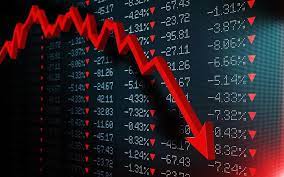
The World Bank has warned that nations around the globe are risking recession as the Ukraine crisis strains economies already strained by the Covid pandemic. Less developed nations in Europe and East Asia are facing a "major recession," according to the report.
The likelihood of high inflation and low growth, or "stagflation," has also increased, according to World Bank President David Malpass. Globally, energy and food prices have been growing.
"The war in Ukraine, lockdowns in China, supply-chain disruptions, and the risk of stagflation are hammering growth. For many countries, recession will be hard to avoid," Malpass said.
He also stated in the World Bank's June Global Economic Prospects report that the risk of stagflation was "high."
"Subdued growth will likely persist throughout the decade because of weak investment in most of the world. With inflation now running at multi-decade highs in many countries and supply expected to grow slowly, there is a risk that inflation will remain higher for longer."
Also on Tuesday, the World Bank authorised an additional $1.49 billion (£1.2 billion) in assistance for Ukraine, which it stated will be used to "pay for wages for government and social employees."
The new funding is part of a $4 billion support package for the country, which includes healthcare, education, and sanitation.
More than a hundred days have gone since Russia's invasion of Ukraine, but the magnitude of the shock waves affecting nations and households thousands of kilometres away is only now becoming obvious.
Developing countries were already striving to regain their footing. For every $20 that households there used to make before the outbreak, they now only get $19.
However, rising food and energy prices threaten to send livelihoods into reverse, resulting in misery and hardship for the most vulnerable.
This is not limited to poorer countries. According to one survey, one in every six British households has used a food bank.
This worldwide fight could be exacerbated by increasing interest rates used to combat inflation, just when government assistance to combat the pandemic is dwindling.
The World Bank is advocating quick action, including debt relief to a moratorium on food export restrictions.
Instead, they want authorities to demonstrate that they are working together to protect food and energy supplies, calm volatile markets, and reduce price surges.
Policymakers have already had to deal with a remarkable conflict.
However, the World Bank warns that if we do nothing now, we will face an even longer and more terrible catastrophe. Today's hardship is more than simply suffering and social instability; it may wreak havoc on people's lives for years.
According to the World Bank, Ukraine and Russia are the European countries most likely to experience a severe reduction in economic output in 2022. However, it cautioned that the consequences of the conflict and the Covid epidemic would be far-reaching.
"Even if a global recession is averted, the pain of stagflation could persist for several years - unless major supply increases are set in motion," Malpass said.
Global growth is expected to drop by 2.7 percentage points between 2021 and 2024, according to Malpass, more than twice the slowdown seen between 1976 and 1979, when the globe last experienced stagflation.
The research cautioned that the interest rate increases required to manage inflation towards the end of the 1970s were so severe that they triggered a global recession in 1982, as well as a series of financial crises in rising market and developing nations.
However, the currency was weaker and oil was more expensive in the 1970s.
Ayhan Kose, director of the World Bank's Prospects Group, told the media that "there is not much governments can easily do" to combat growing energy prices.
"They shouldn't introduce export bans, they shouldn't introduce subsidies, they shouldn't introduce price controls," Kose said.
"Those type of interventions distort prices and they translate into even higher prices," he added.
(Source:www.nationalherald.com)
The likelihood of high inflation and low growth, or "stagflation," has also increased, according to World Bank President David Malpass. Globally, energy and food prices have been growing.
"The war in Ukraine, lockdowns in China, supply-chain disruptions, and the risk of stagflation are hammering growth. For many countries, recession will be hard to avoid," Malpass said.
He also stated in the World Bank's June Global Economic Prospects report that the risk of stagflation was "high."
"Subdued growth will likely persist throughout the decade because of weak investment in most of the world. With inflation now running at multi-decade highs in many countries and supply expected to grow slowly, there is a risk that inflation will remain higher for longer."
Also on Tuesday, the World Bank authorised an additional $1.49 billion (£1.2 billion) in assistance for Ukraine, which it stated will be used to "pay for wages for government and social employees."
The new funding is part of a $4 billion support package for the country, which includes healthcare, education, and sanitation.
More than a hundred days have gone since Russia's invasion of Ukraine, but the magnitude of the shock waves affecting nations and households thousands of kilometres away is only now becoming obvious.
Developing countries were already striving to regain their footing. For every $20 that households there used to make before the outbreak, they now only get $19.
However, rising food and energy prices threaten to send livelihoods into reverse, resulting in misery and hardship for the most vulnerable.
This is not limited to poorer countries. According to one survey, one in every six British households has used a food bank.
This worldwide fight could be exacerbated by increasing interest rates used to combat inflation, just when government assistance to combat the pandemic is dwindling.
The World Bank is advocating quick action, including debt relief to a moratorium on food export restrictions.
Instead, they want authorities to demonstrate that they are working together to protect food and energy supplies, calm volatile markets, and reduce price surges.
Policymakers have already had to deal with a remarkable conflict.
However, the World Bank warns that if we do nothing now, we will face an even longer and more terrible catastrophe. Today's hardship is more than simply suffering and social instability; it may wreak havoc on people's lives for years.
According to the World Bank, Ukraine and Russia are the European countries most likely to experience a severe reduction in economic output in 2022. However, it cautioned that the consequences of the conflict and the Covid epidemic would be far-reaching.
"Even if a global recession is averted, the pain of stagflation could persist for several years - unless major supply increases are set in motion," Malpass said.
Global growth is expected to drop by 2.7 percentage points between 2021 and 2024, according to Malpass, more than twice the slowdown seen between 1976 and 1979, when the globe last experienced stagflation.
The research cautioned that the interest rate increases required to manage inflation towards the end of the 1970s were so severe that they triggered a global recession in 1982, as well as a series of financial crises in rising market and developing nations.
However, the currency was weaker and oil was more expensive in the 1970s.
Ayhan Kose, director of the World Bank's Prospects Group, told the media that "there is not much governments can easily do" to combat growing energy prices.
"They shouldn't introduce export bans, they shouldn't introduce subsidies, they shouldn't introduce price controls," Kose said.
"Those type of interventions distort prices and they translate into even higher prices," he added.
(Source:www.nationalherald.com)





